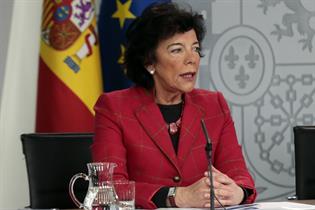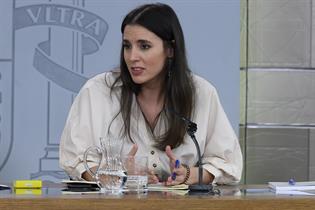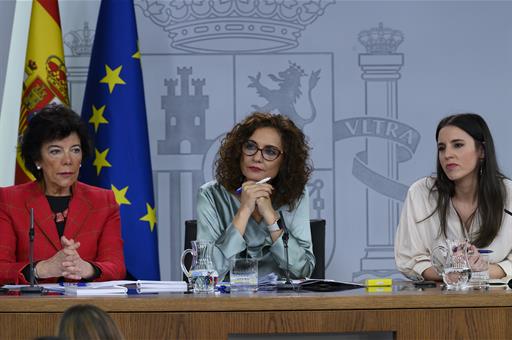Council of Ministers
Government files for injunction to force Regional Government of Murcia to withdraw 'parental veto' on education centres
Council of Ministers - 2020.1.17
Moncloa Palace, Madrid
The Council of Ministers agreed to file for an injunction against the Regional Government of Murcia to re-establish legality and withdraw the 'parental veto' on education centres whereby the parents of pupils must express explicit consent for their children to attend any type of scheduled activity at the centre.
The Minister for the Treasury and Government Spokesperson, María Jesús Montero, explained that the government will appeal through administrative or legal channels against any attempt to violate the rights of children to receive comprehensive education and to uphold respect for fundamental freedoms.
"We will be firm in the defence of all citizens, particularly children. And when addressing any actions that we consider are violating their rights, prevailing legislation or international conventions, we will respond decisively", she asserted.
Re-establishment of legality
 Pool Moncloa/JM CuadradoAlong the same line, the Minister for Education and Vocational Training, Isabel Celaá, pointed out that the imposition of the 'parental veto' does not refer to voluntary activities, but to those that form part of the basic curriculum, which are compulsory in the education system and form part of the fundamental right of the individual to receive education, and hence the decision adopted by the Regional Government of Murcia is unacceptable.
Pool Moncloa/JM CuadradoAlong the same line, the Minister for Education and Vocational Training, Isabel Celaá, pointed out that the imposition of the 'parental veto' does not refer to voluntary activities, but to those that form part of the basic curriculum, which are compulsory in the education system and form part of the fundamental right of the individual to receive education, and hence the decision adopted by the Regional Government of Murcia is unacceptable.
The minister argued that the measure violates the fundamental right to education, goes against constitutional values as reflected in constitutional laws and against the ability, attributed by law, of education centres to determine their own school curriculum.
Isabel Celaá announced on Friday that the government will lodge a judicial appeal against any initiative that undermines the right to education and censors the actions of education centres and their teachers.
Education in egalitarian values
The Minister for Equality, Irene Montero, announced that she will appear, of her own volition, before the Monitoring Committee of the State Pact to Combat Gender-based Violence in the Lower House of Parliament, since the 'parental veto' is a "flagrant violation" of the pact.
 Pool Moncloa/Borja Puig de la Bellacasa This pact, she recalled, "literally speaks about strengthening and extending affective-sexual education, and we consider that the 'parental veto' is a clear example of censorship in education and, above all, of male dominance".
Pool Moncloa/Borja Puig de la Bellacasa This pact, she recalled, "literally speaks about strengthening and extending affective-sexual education, and we consider that the 'parental veto' is a clear example of censorship in education and, above all, of male dominance".
The minister argued that the children of homophobic or male chauvinist parents have the same rights as other children to be educated regarding the respect and promotion of human rights, regarding feminism, equality and those values that allow us to live a dignified life.
Irene Montero stressed that for the government, education in egalitarian values and affective-sexual education are pillars of the democracy and the best way to guarantee citizen security.
Appointments
The government approved new appointments at different levels of the public administration, which affect almost all ministerial departments.
María Jesús Montero highlighted the appointment of María Gámez as the first woman to hold the position of Director-General of the Guardia Civil in the 175 years of history of the armed institution. She also underlined that María Gámez was also the first woman to hold the post of Government Sub-Delegate in Malaga.
First coalition government of democracy
 Pool Moncloa/Borja Puig de la Bellacasa During her first appearance as spokesperson for the new government, María Jesús Montero stressed that this government was born out of a vocation to respond to the real problems of citizens, and accordingly, it approved a pension rise on Tuesday and set out its priorities.
Pool Moncloa/Borja Puig de la Bellacasa During her first appearance as spokesperson for the new government, María Jesús Montero stressed that this government was born out of a vocation to respond to the real problems of citizens, and accordingly, it approved a pension rise on Tuesday and set out its priorities.
The Government Spokesperson expressed her pride at being a member of the first coalition government in Spain's recent democratic history, made up of "capable, committed and animated men and women". This Cabinet, she said, includes different profiles but has a "single, clear and shared roadmap" that it will follow with "absolute dedication and commitment".
María Jesús Montero also declared her conviction over the essential role of the press in building a democratic society. "Without critical and truthful journalism, it is not possible to have a democracy". "I guarantee that we will work with the maximum efficacy, diligence and transparency, and be held accountable to our citizens", she added.
Current affairs
When asked about the government's decision to nominate Dolores Delgado as the New Attorney General, the Government Spokesperson recalled that the General Council of the Judiciary has confirmed that the candidate complies with the legal requirements to be appointed, and hence the process remains ongoing.
She also clarified that when the government speaks about the "dejudicialisation" of the system of justice it is referring to not bringing affairs subject to political controversy or conflict before the courts. "Politics should not be allowed to hide behind legal robes".
María Jesús Montero also expressed her confidence in the renewal of all those pending legal bodies taking place as soon as possible. In this regard, she announced that the government will contact the main opposition party to negotiate the renewal of the General Council of the Judiciary and the Constitutional Court.
The Minister for the Treasury called for "institutional loyalty" from all regional governments and stressed that the Fiscal and Financial Policy Council will be convened "very shortly".
Non official translation





